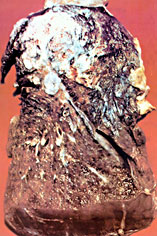|
|
|
|
|
Healthy lung
|
Emphysema lung
|
Cancerous lung
|
|
|
|
 Source: American Lung Association.
Source: American Lung Association.
|
|
The major purpose of the lungs is the exchange of gas. We breathe in oxygen and breathe out carbon dioxide, a waste product. Oxygen is essential to the body – it provides the fuel our cells and organs require to function.
Cigarette smoking can eventually cause uncontrolled reproduction of cells in the lung, which results in cancer, or destruction of tiny air sacs, which results in emphysema. While healthy lung tissue is pink in color, lungs with emphysema or cancer are black.
|
|
|
|
Smoking
Smoking is responsible for almost 90 % of all cases of lung cancer
Secondhand smoke
The June 2006 report of the Surgeon General concluded that there is no risk-free level of exposure to secondhand smoke.
Occupational and environmental exposure
People routinely exposed to certain products, such as radon, a colorless gas often found in the home, and asbestos, used in brake repair and shipbuilding, are at increased risk, especially if they smoke.
Industrial exposure
Risk increases for people exposed to certain industrial chemicals, such as cadmium, uranium, and arsenic.
Personal or family history
A person who has had lung cancer or has a parent or sibling with lung cancer may be at increased risk.
Tuberculosis
Those with lung diseases, such as tuberculosis (TB), are at higher risk.
|
Lung Cancer SIGNS AND SYMPTOMS
|
- Persistent cough
- Blood-streaked sputum
- Constant chest pain
- Repeated bouts of pneumonia or bronchitis
- Shortness of breath, wheezing, or hoarseness
- Fatigue
- Loss of weight or appetite
Source: National Cancer Institute
|
Lung Cancer SCREENING 101
|
- There is no effective screening for lung cancer
- The best way to prevent lung cancer is to not smoke or breathe in the smoke of others
- The risk of lung cancer depends on the number of cigarettes smoked a day, the number of years of smoking, and how deeply you inhale
- If you have smoked 20 cigarettes (one pack) a day for 15 years and paid about $5 a pack, you have smoked 109,575 cigarettes at a cost of $27,320
- Reduced tar or light cigarettes do not reduce the risk of lung cancer
- Roughly 60 % of people diagnosed with lung cancer die within one year of diagnosis
- If lung cancer has spread to distant parts of the body, the 5-year survival rate is 2%.
- If you stop smoking before lung cancer begins, the lungs return to normal
Source: American Cancer Society.
|
|
|
|
